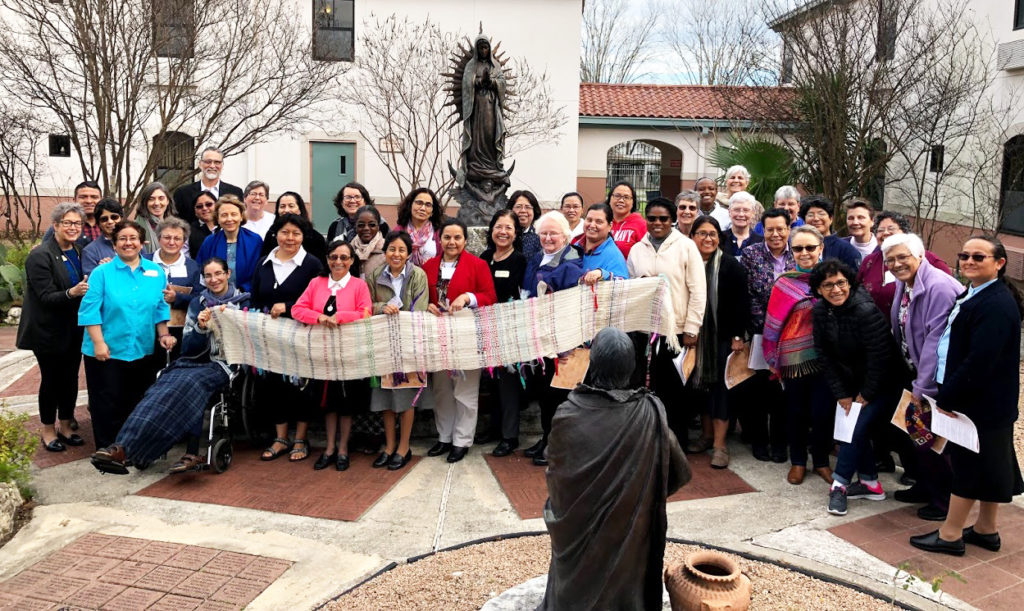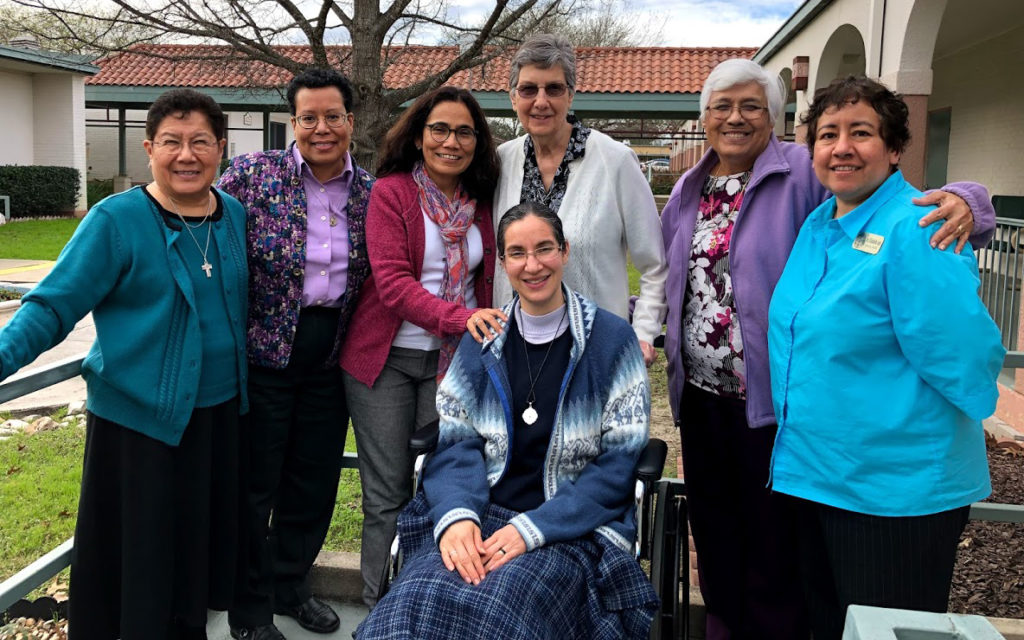In the Summa Theologica, St. Thomas Aquinas said love takes up where knowledge leaves off. This can be interpreted as love takes us beyond the limitations of knowledge. Similarly, the Gospel invites us to discipleship, to take what we’ve learned, with love, to others and build relationships. In our new intercultural resources program, Weaving Cultures-Entrelazando Culturas, MACC is simultaneously teaching and learning how we can go beyond the academic theory of interculturality to truly live it in life giving ways.
From February 5-7, twenty-eight Catholic nuns from seven communities gathered at MACC for the first residential program of Weaving Cultures. Colombia, Angola, Philippines, Kenya and Mexico were some of the countries represented in this diverse group. The residential program was led by Fr. Anthony Gittins, CSSp, a missionary pastor, professor of theology and culture at The Catholic Theological Union in Chicago, and a recognized leading expert in interculturality. Fr. Gittins began his first afternoon session by saying “Faith can only be lived culturally.” 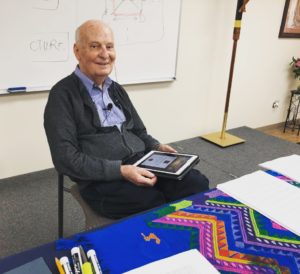
He went on to explain that living interculturally goes beyond mixing people of different cultures to live together and maybe letting each person cook an authentic meal from their culture once a month. It’s a mutual, authentic and intentional exchange between people. One where we break down the barriers not the differences.
“The challenge I see in intercultural living is that it’s a lot of hard work when you have to look at the part of culture that’s underneath, kind of like an iceberg, and those are things like time, perceptions, our values,” said Sr. Rosa María Ortiz, a member of the Sisters of the Incarnate Word and Blessed Sacrament. “But the gift I see is that because of the hard work and energy that we put into it, we become closer to being the Kingdom of God that Jesus spoke to us about and that makes all the effort very fruitful and faithful.”
In the spirit of creating something new, each day began with a ritual, listening to different creation stories. The sisters spent three days gradually getting to know each other by sharing pieces of their background and cultural experiences.
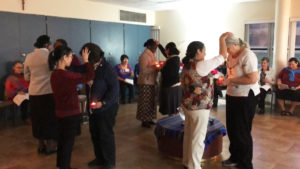
“One of the things for me is that the vision of what is an intercultural experience grows a lot. It is no longer just my vision of when I was a little girl, of my people, of my country, of my culture, but there is much more, a whole series of opportunities,” said Sr. Ruth Tigüilá, a member of the Sisters of Charity of the Incarnate Word, Houston and originally from Guatemala. “As a daughter of God, as a member of a faith-based congregation, this experience also allows me to go through a process and deepen much more in who I am, in my call, the religious life and in my service and accompaniment that I give to other people.”
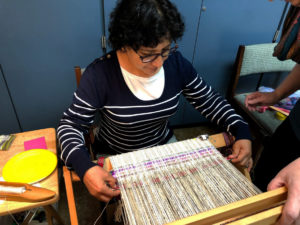
The teams participating in Weaving Cultures-Entrelazando Culturas are elected and other leaders in the following seven congregations: the Congregation of the Sisters of Charity of the Incarnate Word from Houston, Texas; Sisters of the Incarnate Word and Blessed Sacrament from Corpus Christi, Texas; Missionary Sisters of the Sacred Heart of Jesus (Cabrini), Guadalupe Province, and Provincia Santa Francisca Cabrini; Poor Handmaids of Jesus Christ, Mexico Pro Region/American province; Sisters of Mercy of the Americas, including South Central Community and Philippines Community; Sisters Servants of the Immaculate Heart of Mary from Scranton of Pennsylvania; and Compañía de Santa Teresa de Jesús (Teresianas), Provincia de Colombia, Provincia de Angola, Provincia México Norte, Provincia de Europa.
Entrelazando-Culturas: Respondiendo a los Signos de Nuestro Tiempo
En la Suma Teológica, Santo Tomás de Aquino dijo que el amor ocupa el sitio que el conocimiento deja. Esto puede ser interpretado como que el amor nos lleva más allá de las limitaciones del conocimiento. Del mismo modo, el Evangelio nos invita al discipulado, a llevar lo que hemos aprendido, con amor, a los demás y a crear relaciones. En nuestro nuevo programa de recursos interculturales, Weaving Cultures-Entrelazando Culturas, MACC está enseñando y aprendiendo simultáneamente cómo podemos ir más allá de la teoría académica de la interculturalidad para vivirla verdaderamente en maneras de dar vida.
educación de la interculturalidad a vivirla verdaderamente en las congregaciones religiosas.
Del 5 al 7 de febrero, veintiocho religiosas católicas de siete comunidades se reunieron en MACC para el primer programa residencial de Weaving Cultures. Colombia, Angola, Filipinas, Kenia y México fueron algunos de los países representados en este grupo diverso. El programa residencial fue dirigido por el Padre Anthony Gittins, CSSp, un pastor misionero, profesor de teología y cultura en The Catholic Theological Union en Chicago, y un reconocido experto en interculturalidad. El Padre Gittins empezó su primera sesión de la tarde diciendo “La fe solo puede ser vivida culturalmente”.
Él continuó explicando que vivir interculturalmente va más allá de mezclar a personas de diferentes culturas para que vivan juntas y quizá dejar que cada persona cocine una comida auténtica de su cultura una vez al mes. Es un intercambio mutuo, auténtico e intencional entre personas. Uno donde rompemos las barreras, no las diferencias.
“El reto que veo en la vida intercultural es que es mucho trabajo duro cuando tienes que ver la parte de la cultura que está debajo, como en un témpano, y ésas son cosas como el tiempo, las percepciones, nuestros valores”, dijo la Hna. Rosa María Ortiz, miembro de las Hermanas del Verbo Encarnado y del Sagrado Sacramento. “Pero el don que veo es que por el trabajo duro y la energía que ponemos en él, nos acercamos más a ser el Reino de Dios del que Jesús nos habló y eso hace que todo el esfuerzo sea muy fructífero y fiel”.
En el espíritu de crear algo nuevo, cada día iniciaba con un ritual, escuchando diferentes historias de la creación. Las hermanas pasaron tres días conociéndose unas a otras gradualmente, al compartir fragmentos de sus antecedentes y experiencias culturales.
“Una de las cosas para mí es que la visión de lo que es una experiencia intercultural aumenta mucho. Ya no es solo mi visión de cuando era niña, de mi gente, de mi país, de mi cultura, sino que hay mucho más, toda una serie de oportunidades”, dijo la Hermana Ruth Tigüilá, miembro de las Hermanas de la Caridad del Verbo Encarnado de Houston, originaria de Guatemala. “Como hija de Dios, como miembro de una congregación basada en la fe, esta experiencia también me permite pasar por un proceso y profundizar mucho más en quién soy, en mi llamado, en la vida religiosa y en mi servicio y el acompañamiento que le doy a otras personas”.

Los equipos que participan en Weaving Cultures-Entrelazando Culturas son elegidos y otros líderes en las siete siguientes congregaciones:: la Congregación de las Hermanas de la Caridad del Verbo Encarnado de Houston, Texas; las Hermanas del Verbo Encarnado y el Sagrado Sacramento de Corpus Christi, Texas; las Hermanas Misioneras del Sagrado Corazón de Jesús (Cabrini), Provincia Guadalupe, y Provincia Santa Francisca Cabrini; las Siervas Pobres de Jesucristo, Pro-Región de México /Provincia Americana; las Hermanas de la Misericordia de las Américas, incluyendo la Comunidad Sur Central y la Comunidad de las Filipinas; las Hermanas Siervas del Inmaculado Corazón de María de Scranton, Pennsylvania; y la Compañía de Santa Teresa de Jesús (Teresianas), Provincia de Colombia, Provincia de Angola, Provincia México Norte, Provincia de Europa.

